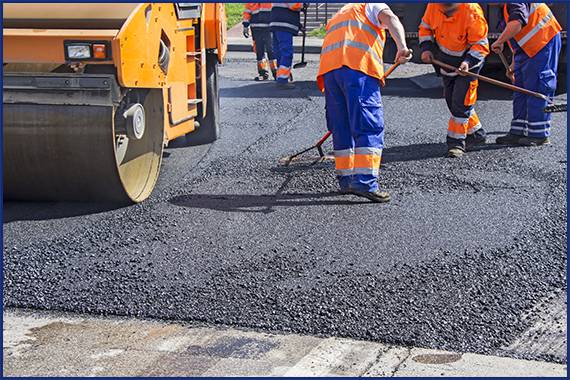Exploring the Various Sorts Of Asphalt Paving and Their Advantages
From the robust attributes of Hot Mix Asphalt to the green attributes of Recycled Asphalt Pavement, recognizing these options can considerably affect project end results. Technologies such as Warm Mix Asphalt and Porous Asphalt introduce added layers of effectiveness and sustainability.
Hot Mix Asphalt
When considering the most effective paving services, warm mix asphalt (HMA) stands apart as a premier option for lots of applications (paving). HMA is a flexible paving product understood for its durability, versatility, and total efficiency. It is generated by heating asphalt binder and incorporating it with accumulations at high temperature levels, making certain a consistent combination that can hold up against numerous ecological problems
One of the main advantages of HMA is its capacity to provide a smooth, skid-resistant surface, boosting security for automobiles and pedestrians alike. Furthermore, HMA displays exceptional resistance to contortion, making it ideal for high-traffic areas such as highways and car park. Its flexibility to various environments better contributes to its prevalent use.
The installation procedure of HMA is fairly quick, enabling effective project conclusion with very little disruption to website traffic. Additionally, it can be recycled, lowering waste and advertising sustainability within the building industry. Overall, warm mix asphalt remains a leading choice for paving specialists because of its durable performance features and long-lasting cost-effectiveness, making it a reliable remedy for various framework needs
Cozy Mix Asphalt
Cozy mix asphalt (WMA) provides a cutting-edge choice to hot mix asphalt, supplying similar benefits while calling for lower manufacturing temperature levels. Usually generated at temperatures between 190 ° F and 250 ° F, WMA modern technology decreases power consumption and greenhouse gas exhausts throughout manufacturing, making it a much more eco-friendly choice.
Among the key advantages of WMA is its prolonged workability duration. The reduced temperatures enable for much more efficient transportation and positioning, especially in cooler weather. This adaptability can bring about improved compaction and general longevity of the asphalt surface. Additionally, WMA can be utilized in different applications, ranging from highways to property driveways, without endangering efficiency.

The consolidation of additives or modified binders in WMA contributes to its enhanced residential or commercial properties, guaranteeing that it meets or exceeds efficiency criteria. Furthermore, WMA's reduced thermal impact throughout production can reduce the likelihood of damages to the surrounding environment, making it an attractive selection for sustainable paving methods.
Cold Mix Asphalt
Cold mix asphalt is a functional paving option commonly made use of for short-term fixings and low-traffic locations. This sort of asphalt is created at ambient temperature levels, making it a practical selection for quick repairs and tasks where conventional warm mix asphalt might not be possible. The blend generally is composed of asphalt binder, accumulation, and additives, permitting it to continue to be practical for an extensive duration.
One of the main advantages of cool mix asphalt is its ease of application. It can be set up without customized equipment, making it available for smaller sized contractors and DIY lovers. Furthermore, cool mix can be used in various weather, which is specifically useful for immediate repair needs.

Cold mix asphalt is additionally cost-effective, as it permits for budget-friendly repairs without giving up top quality. Its versatility makes it ideal for covering holes, filling cracks, and resurfacing driveways. Although it may not provide the same long-term resilience as hot mix asphalt, its quick application and versatility make it an outstanding selection for short-term services and low-traffic applications. On the whole, chilly mix asphalt continues to be a functional choice in the asphalt paving landscape.
(join us)
Permeable Asphalt
Porous asphalt is an innovative paving remedy created to enhance stormwater management and minimize surface area overflow. This kind of asphalt includes a distinct structure that includes interconnected spaces, enabling water to permeate via the surface and right into the underlying layers. By assisting in all-natural drain, porous asphalt assists reduce the threat of flooding and reduces the burden on local stormwater systems.
One of the key benefits of permeable asphalt is its ability to boost water high quality. As stormwater infiltrate the sidewalk, pollutants and debris are trapped, minimizing the number of pollutants that enter regional rivers. This adds to much healthier communities and sustains conformity you could try here with environmental laws.
Additionally, permeable asphalt can enhance the durability of the sidewalk itself. By decreasing water buildup on the surface, it lessens the possibility for freeze-thaw cycles that can result in splitting and deterioration. Moreover, the lowered need for standard stormwater monitoring infrastructure can result in expense financial savings for municipalities and designers.
Recycled Asphalt Sidewalk
(see details)Recycled asphalt sidewalk (RAP) represents a sustainable technique to highway construction and maintenance that profits both the setting and the economy. By reusing existing asphalt materials, RAP decreases the need for brand-new resources, which in turn conserves natural deposits and lessens ecological influence. This technique lowers energy consumption and greenhouse gas discharges related to the manufacturing of brand-new asphalt.
The consolidation of RAP right into brand-new pavement mixtures can also result in considerable expense financial savings. Specialists can utilize recycled products to minimize total task expenditures, making it a financially sensible alternative for districts and exclusive programmers alike. Furthermore, RAP uses similar performance qualities to virgin asphalt, ensuring resilience and longevity in roadway surface areas.
RAP's adaptability enables it to be used in different applications, including freeways, car park whole lots, and property driveways. By improving the structural integrity of existing sidewalks, RAP adds to improved safety and security and level of smoothness of roads.
Conclusion
Finally, the diverse sorts of asphalt paving each deal distinct advantages customized to particular requirements. Warm Mix Asphalt masters resilience and quick setup for high-traffic areas, while Cozy Mix Asphalt improves sustainability through lowered energy consumption. Cold Mix Asphalt acts as an economical alternative for immediate repair work, Porous Asphalt effectively handles stormwater, and Recycled Asphalt Pavement advertises environmental duty. Collectively, these leading services add to effective, eco-friendly techniques in the construction sector.